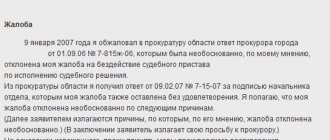The effectiveness of the state directly depends on the legal literacy of citizens. The prosecutor's office, among its many responsibilities, is responsible for clarifying aspects of legal activity through the exercise of supervisory functions.
Education in the field of law is carried out by eliminating and preventing offenses. According to Law No. 182, prosecutors are required to clarify the legislation when contacted by the public. Appealing a refusal or ignoring the requirement to provide an explanation, referred to as inaction of the prosecutor's office, is subject to mandatory review in accordance with current legislation.
Persons whose legitimate interests are violated or affected during the proceedings, regardless of whether these are criminal proceedings or procedural actions, have the right to appeal against the actions of the prosecutor.
The purpose of challenging the actions or inactions of the prosecutor is:
- ensuring respect for the rights of persons involved in the process;
- identification of violations of the legal rights of individuals and legal entities;
- detection of mistakes made by the prosecutor;
- elimination of violations committed by the prosecutor.
The procedure for handling appeals and complaints is regulated by law - Figure 1.
Figure 1. Provisions for the process of processing complaints and other requests from citizens
Where to file a complaint
According to Article 8 of Federal Law No. 59-FZ dated May 2, 2006 “On the procedure for considering appeals from citizens of the Russian Federation,” a citizen submits his appeal to an official competent in resolving the conflict that has arisen. Violating the legal chain of command or sending a document to the wrong authority will lead to bureaucratic red tape.
Article 11 of the Federal Law “On the Prosecutor's Office of the Russian Federation” defines the system of prosecutorial bodies and the hierarchy of prosecutorial employees. According to this norm, the superior prosecutor is:
- Prosecutor General for employees of the General Prosecutor's Office and prosecutors of the constituent entities of the Russian Federation, equivalent military and other specialized prosecutor's offices.
- Prosecutor of the subject for employees of the prosecutor's office of the subject and equivalent prosecutor's offices, district prosecutors.
- City or district prosecutor for employees of city or district prosecutor's offices and equivalent prosecutor's offices.
The procedure for appealing the prosecutor's decision
The first instance for filing an appeal is the higher authority regarding where the decision was made. Complaints are reviewed only in a hierarchical manner.
An appeal against the prosecutor's decision by filing an application can be made either in person through the reception office of the prosecutor's office, or electronically or by mail. There can also be appeals from one person or collective ones. Review of the submitted application is mandatory and free of charge. An authorized person (or group) conducts a review and a series of actions to verify certain aspects within seven working days from the receipt of such a request (noted in a special log of received requests). If a complaint is redirected to another structural unit, the initiator of the complaint must be notified. All legal institutions may be involved in the verification.
Figure 3. Structure of the prosecutor's office
Requirements for a complaint
Article 11 of the Law on Citizens' Appeals establishes two main requirements for a citizen's written appeal:
- The text should not use obscene or offensive language ; you cannot write threats against an official and his family members. Otherwise you will not receive a response.
- The text must be legible and readable . Otherwise, within seven days from the date of registration of the complaint, if your data was written clearly, you will be informed that the complaint could not be read.
The text must be logically consistent and not cause ambiguity or discrepancies. You should adhere to a business style, avoid colloquial speech, slang, and phraseological units. The information should be relevant and relate to the essence of the problem you are describing. State the situation in detail necessary to resolve the case.
An important element of such a document is the indication of regulatory legal acts, some of the rules of which were not properly complied with.
Time limit for appealing the received response from the prosecutor's office to the complaint
The time frame for consideration of applications is regulated by Law No. 59-FZ. A filed appeal against the actions of the prosecutor's office is considered within 30 days from the date of registration. This period does not increase when redirecting. Based on the results of the review, a decision may be made to fully or partially satisfy the requests of the application or to refuse to fulfill the stated requirements. An explanation of the decision made must be included.
If the application is considered by a judge, then the processing time is 5 calendar days, after which a court hearing is scheduled, and the personal participation of all persons whose interests are affected by this application is required.
When appealing to the highest authority without consideration according to the hierarchy, the appeal without consideration is sent to the corresponding lower structural unit, and the consideration period is increased by 7 working days.
Figure 4. Regulatory acts regulating the consideration of appeals
Form and content of a complaint to the prosecutor’s response
The complaint can be written in free form, since its content is determined in each individual situation. In this regard, the list of attached documents is changing.
Article 7 of the Law on Citizens' Appeals establishes mandatory information for a citizen's written appeal. These include:
- Name of the body or full name and position of the person to whom the document is sent.
- Full name of the citizen.
- Postal or email address to which the response will be sent.
- The essence of the appeal.
- List of attached documents.
- Personal signature.
- date.
If the document does not contain at least one of the above requirements, in accordance with Part 1 of Article 11 of the above-mentioned law, the official has the right not to write you a response. A sample of this written request can be viewed here.
On the official websites of prosecutors' offices there are special forms for citizens' appeals. Additional mandatory information is the applicant's email address and sometimes an electronic digital signature.
Before you sign and date the document, demand in your complaint that your rights be restored, that an investigation be carried out against the official, and that he be brought to disciplinary action.
Rules for preparing documents for appeal
Protesting the prosecutor's decision is made by initially contacting the prosecutor's office. The appeal process must be run according to the structure of the authority. It is not possible to appeal the decision of the district prosecutor by submitting documents to the Prosecutor General's Office. Such an appeal will be forwarded to the appropriate lower authority without consideration.
The appeal is made in writing and contains:
- exact full name of the circulation authority;
- Full name of the person submitting the application, current address (confirmed by identity documents);
- a detailed description of the situation in which the violation occurred;
- the essence of the appeal (what we are trying to achieve with the complaint);
- a request to perform a number of actions necessary to identify a violation;
- evidence of violation;
- date of sending the application, full name and signature of the person who is the applicant.
There is no single model, in each case different arguments are involved, the thematic issue is considered. You can analyze the general design style and appearance of the document using the sample from Fig. 2.
Figure 2. Sample complaint about the inaction of a bailiff
How to apply
Here's how to properly file a complaint with the prosecutor's office:
- Written applications are sent by mail, transmitted through the reception or by fax, sent by telegram and other means (clause 2.1 of the instructions).
- An electronic appeal is sent through State Services or through the regional website of the department.
- The oral communication is registered at a personal reception of officials.
Through State Services, the appeal will be sent to the general department.
To register through the department's website, authorization through State Services is not required.
The algorithm for submitting other requests is identical.
Is it possible to appeal the prosecutor's protest?
Yes, you can.
The possibility of appealing the prosecutor's protest is due to the fact that the courts consider it permissible to apply to it the approach formulated by the Constitutional Court of the Russian Federation in relation to the prosecutor's presentation, namely (Definition of the Constitutional Court of the Russian Federation dated February 24, 2005 N 84-O):
• it is not absolute and does not have the power of enforcement;
• it can be challenged in court;
• verification of the legality and validity of the prosecutor's decisions is the prerogative of higher prosecutors and courts.
In addition, there are examples of judicial practice in which courts, even without reference to the position of the Constitutional Court of the Russian Federation, recognize the right of organizations to challenge prosecutors’ protests. For example, Resolution of the Arbitration Court of the Volga-Vyatka District dated June 17, 2016 N F01-2160/2016 in case N A17-3352/2015.
The essence of the complaint about the inaction of the prosecutor's office and the grounds for writing it
The Prosecutor's Office - as a supervisory authority
According to the laws of the Russian Federation, the prosecutor's office of our country is a body of general supervision over the activities of various types of organizations in terms of their compliance with legislative norms.
Mostly, Russian prosecutors monitor the work of other government agencies, but in some cases their powers may extend to the control of legal entities, as well as their representatives.
In the event that the previously noted subjects of law work outside of their competence, any citizen of the Russian Federation has the right to appeal their activities to the prosecutor's office.
But what to do if the supervisory authority itself is inactive or neglects its powers? Naturally, take appropriate measures, expressed in filing a complaint against representatives of the prosecutor's office to higher authorities.
The grounds for appealing the actions of a prosecutor or even an entire department of a supervisory authority are:
- their inaction when contacted by a citizen;
- the presence of a fact of incompetence in terms of the activities of a government agency;
- a clear violation of the legislation of the Russian Federation by representatives of the prosecutor's office.
Today, you can file a complaint about the inaction or unauthorized activities of the prosecutor’s office only to its higher authorities. These include:
- directly departments of the prosecutor's office of a higher rank than the one whose activities are being appealed by the relevant paper;
- representatives of the supervisory authority who are the highest rank in relation to the prosecutor whose competence is being questioned;
- court.
As a rule, citizens first send their complaints to higher authorities or to higher ranks of the prosecutor's office. If such a measure does not produce results, the problem is dealt with by the court. Let us note that the legislation of the Russian Federation does not define the procedure for appealing the inaction of the prosecutor’s office.
Taking this into account, any person has the right to appeal the activities of the prosecutor immediately through the court, bypassing an appeal to higher prosecutors or departments of the supervisory authority. This approach is completely legal and cannot be in any way infringed upon by government agencies when implemented by a citizen.
Which court should I go to to appeal the prosecutor’s protest?
Protests by the prosecutor are usually appealed in court. Applying by analogy the approach to appealing the prosecutor’s presentation given by the Supreme Court of the Russian Federation (question 19 of the Review of Judicial Practice No. 3 (2015)), you can appeal the protest either to a court of general jurisdiction according to the rules of Chapter. 22 CAS RF, or to the arbitration court according to the rules of Chapter. 24 Arbitration Procedure Code of the Russian Federation.
The prosecutor's protests against the acts of organizations are appealed to the arbitration court if they relate to their entrepreneurial or other economic activities. For example, this applies to acts of an organization on setting tariffs (Resolution of the Arbitration Court of the Volga-Vyatka District of June 17, 2016 N F01-2160/2016 in case N A17-3352/2015).
You need to contact the arbitration court of a constituent entity of the Russian Federation at the address of the prosecutor's office in which the prosecutor serves (part 1 of article 34, article 35, part 1 of article 197 of the Arbitration Procedure Code of the Russian Federation).
The prosecutor's protests are appealed in a court of general jurisdiction if they are brought in relation to acts that do not directly relate to the entrepreneurial activities of organizations. For example, these are acts regulating labor relations:
• local regulations - for example, internal labor regulations (Appeal ruling of the Magadan Regional Court dated 02.02.2016 No. 33a-73/2016 in case No. 2a-5083/2015, Appeal ruling of the Khabarovsk Regional Court dated 02.06.2015 in case No. 33- 880/2015);
• individual acts - for example, orders of dismissal (Decision of the Supreme Court of the Russian Federation dated January 20, 2020 No. 20-KG19-11 in case No. 2-329/2018). However, we note that some courts do not recognize as legal the protests raised by the prosecutor against dismissal orders (Determination of the St. Petersburg City Court dated June 14, 2012 N 33-7733/2012).
You should contact the district court according to the rules of Chapter. 22 CAS RF (Articles 17, 19, Parts 1, 2, Article 22 CAS RF).








